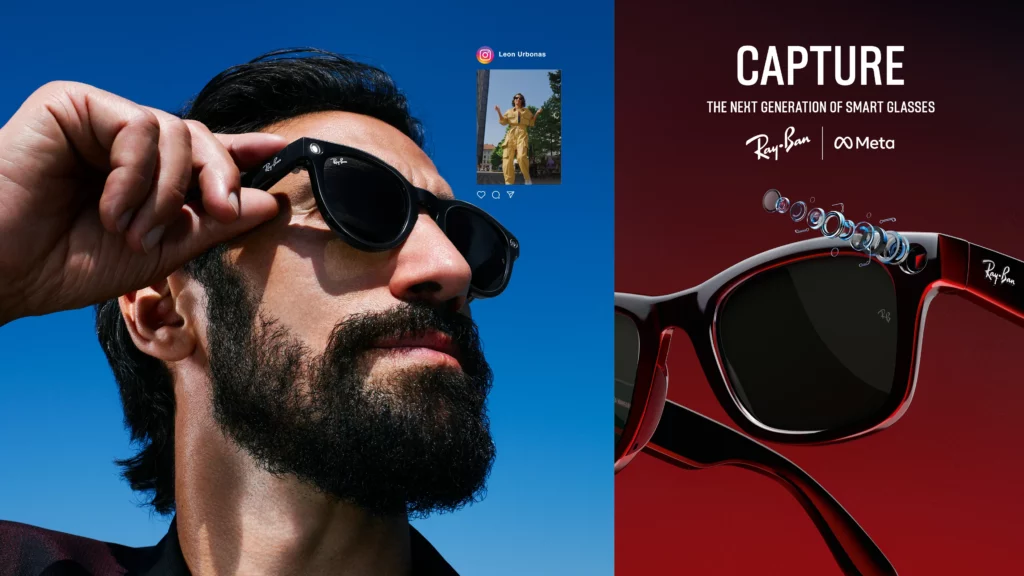Mark Zuckerberg has never been one to shy away from ambitious predictions, and his latest vision? A future where smart glasses replace smartphones as our primary digital tool within the next decade. It’s a bold claim, but if Meta and the rest of the tech industry have their way, we might soon be swapping touchscreens for augmented reality (AR) overlays, voice commands, and gesture controls.
The Rise of Smart Glasses: A Screen-Free Future?
For nearly 30 years, smartphones have been the undisputed centerpiece of modern life—our go-to for communication, entertainment, and endless doomscrolling. But let’s be honest: we’ve hit peak screen fatigue. Notifications are relentless, distractions are constant, and the idea of something less intrusive is starting to sound appealing.
Enter smart glasses—wearable AR devices designed to keep you connected without constantly pulling out a phone.Instead of tapping on a screen, digital information is overlaid onto your real-world view, giving you hands-free access to messages, navigation, and even real-time translations—all without breaking eye contact.
Meta’s Big AR Play: Project Orion
Meta has been making aggressive moves in AR, with Project Orion leading the charge. Unlike previous smart glasses that mostly acted as audio-enabled wearables, Orion promises a full-fledged AR experience—holographic displays, real-time overlays, and a digital interface that blends seamlessly with the real world.
The big selling point? Orion isn’t just about consuming content; it’s about interacting with it. Eye-tracking, voice commands, and hand gestures will allow users to text, call, and navigate without reaching for a physical device. If Meta pulls this off, it could be a serious step toward making smartphones feel obsolete.
Ray-Ban Meta Smart Glasses: A Stepping Stone
While Orion is still in development, Meta has been easing people into the smart glasses era through its partnership with Ray-Ban. The Ray-Ban Meta Smart Glasses aren’t full AR devices, but they’re an important gateway product.

These glasses feature built-in cameras, speakers, and voice control, letting users capture moments, take calls, and stream content hands-free. They might not be the future just yet, but they’re making people comfortable with the idea of wearing tech on their face.
The Competition: Apple, Google & the AR Race
Of course, Meta isn’t the only one betting on AR. Tech giants like Apple and Google are also pouring billions into wearable computing. Apple’s Vision Pro may be a bulky headset today, but it’s proof that the company sees AR as the next big thing. Google, meanwhile, is playing the long game, quietly investing in AR hardware and software development.
What does this mean? The shift away from smartphones isn’t a question of if—it’s when.
AI: The Secret Weapon of Smart Glasses
Smart glasses aren’t just about hardware. AI is the real game-changer.
Imagine looking at a restaurant and instantly seeing its menu, reviews, and available tables. Or reading a text message that appears in your peripheral vision, instead of interrupting your train of thought. AI is what makes these experiences feel natural, helping smart glasses understand context and anticipate your needs.
The Challenges: What’s Holding Smart Glasses Back?
For all the excitement, let’s not get ahead of ourselves. Smart glasses still face major hurdles before they can dethrone smartphones:
- Battery Life – AR requires serious power, and no one wants glasses that die after two hours.
- Processing Power – All that real-time rendering? It’s a heavy computational lift.
- Privacy Concerns – An always-on camera and AI assistant? Expect pushback from privacy advocates.
- Social Acceptance – Let’s not forget what happened to Google Glass. No one wants to be “that guy” wearing surveillance goggles in public.
A Gradual Shift, Not an Overnight Revolution
If history has taught us anything, it’s that tech transitions take time. Smartphones didn’t replace landlines overnight, and the same will likely be true for smart glasses. For the next decade, expect them to coexist—with early adopters embracing AR, while the rest of us wait for the tech to mature.
But make no mistake: the smartphone era is running out of innovation runway. With Meta, Apple, Google, and countless startups chasing the next big thing, we could be looking at a future where we no longer “check” our devices—because our devices are simply part of how we see the world.
So, will smart glasses actually replace smartphones? Maybe not tomorrow. But in ten years? Don’t bet against it.